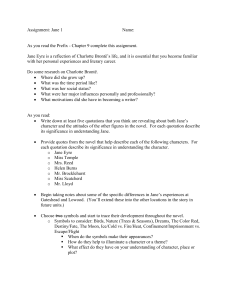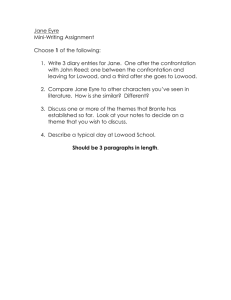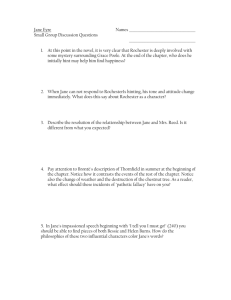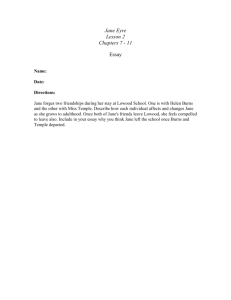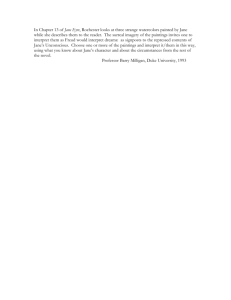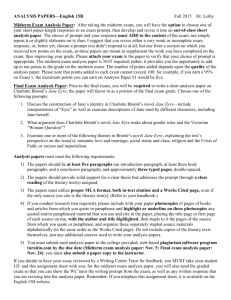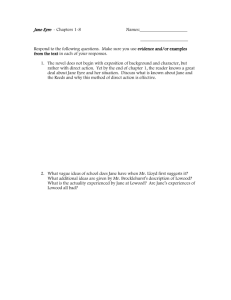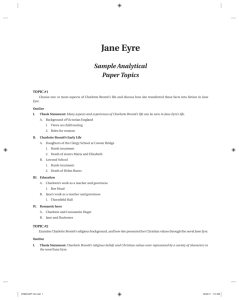File - Mrs. Poncy's Senior Class
advertisement
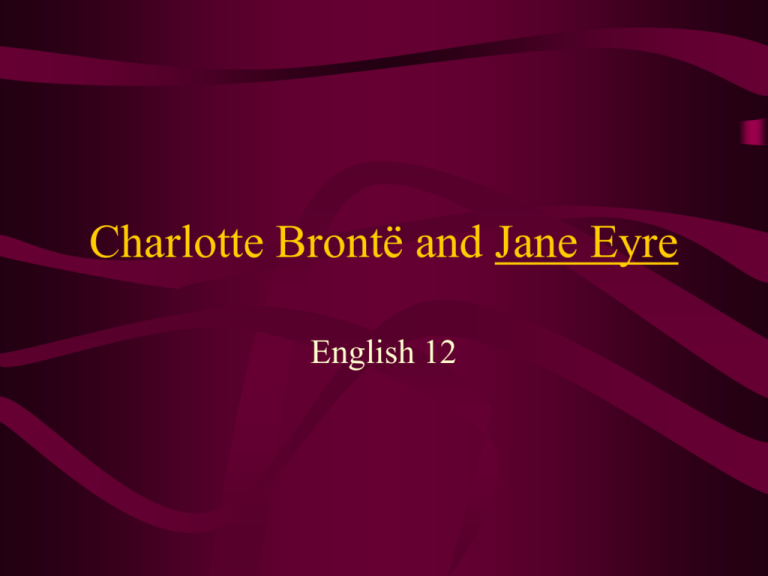
Charlotte Brontë and Jane Eyre English 12 Charlotte Brontë • 1816 - Born at Thornton, Yorkshire, the third daughter of Patrick Brontë and Maria Branwell Brontë. Bronte siblings • Charlotte had 4 sisters, Maria, Elizabeth, Emily, Anne, and a Brother Patrick Branwell. • Their father believed in education, and all the children could read and write very early. • Despite limited means, they had music and drawing tutors. • Patrick also believed in exercise and forced the kids onto the moors as soon as they could walk. • (Anne, Emily & Charlotte) Brontë Family • In 1820 the Brontë family moved to Haworth, where their father, Patrick Brontë became the rector. Shortly after this move, their mother, Maria, fell ill and died. • Their Aunt Elizabeth stayed to look after the Brontë children. Childhood • The atmosphere at Haworth became more gloomy and melancholy. • Patrick withdrew from the children and isolated himself in the church or his study. School • 1824 - Patrick Brontë sent his two oldest daughters, Elizabeth and Maria, to school at Wakefield. They then transferred to the Clergy Daughters' School at Cowan Bridge, Lancashire. Charlotte and Emily joined them there; it would be the model for the school in Jane Eyre. Elizabeth and Maria both returned home to die of consumption (a name for the disease Tuberculosis). Charlotte’s Early Years • 1831 - Charlotte attends Miss Wooler's school at Roe Head. 1832 - Returns home to teach her sisters. 1835 - Returns to Roe Head as a teacher, earning money for her family. 1838 - Resigns her position and returns to Haworth. Governess • 1839 - Charlotte took her first job as governess (a woman employed to educate and train the children of a private household) with the Sidgwick family. • She hated being a governess and felt isolated within the household. Travels • 1839 - Rejects 2 marriage proposals, including one from a young clergyman. 1842 - Charlotte and Emily go to Brussels to study French and German at the Pensionnat Heger. The sisters returned home after the death of their aunt. Disappointments • 1844 - The sisters decided to open a school at Haworth, but no pupils attended. • Branwell was fired as a tutor. He returned home and spent the next 3 years drinking and taking drugs . Creativity • The Brontes had always been a creative family. Growing up with only their siblings for company, they invented stories and fantasy worlds to keep each other entertained. (the Haworth Dining Room where Charlotte wrote Jane Eyre) Writing • 1846 - Charlotte, Emily and Anne publish at their own expense a joint volume of poems, under the pseudonyms of: • Currer Bell • Ellis Bell • Acton Bell • Charlotte begins writing Jane Eyre 1847 Jane Eyre Published Critical Success • Jane Eyre received an immediate enthusiastic response from the critics and the public: it sold well. • Critics and the public thought the author was a man, although there were soon rumors that the author was a woman. A few years later Charlotte was revealed as the true author of Jane Eyre More Dates • 1847 - Later that year, Emily publishes Wuthering Heights and Anne publishes Agnes Grey. They do not receive the same accolades as their sister. • 1848 - Branwell dies of tuberculosis, Emily is also taken by the disease. • 1849 - Anne dies of TB. • 1854 – Charlotte marries Rev. A. B. Nicholls, curate of Haworth. She admired him and did not love him. • 1855 - Charlotte dies of dehydration after contracting pneumonia while pregnant with her first child. Qui ckTime™ and a TIFF (Uncompressed) decompr essor ar e needed to see this picture. Homework • Write 1-2 paragraphs on the following questions: – Many people jokingly say that when you fall in love and get married you tend to lose your freedom and lose yourself as well. Is that true? Do we lose our freedom and the sense of our self when we fall in love and get married? Have you ever seen that happen to anyone before? Characters in Jane Eyre • Jane Eyre - The protagonist and narrator of the novel, Jane is an intelligent, honest, plain-featured young girl forced to contend with oppression, inequality, and hardship. • Edward Rochester - Jane's employer and the master of Thornfield, Rochester is a wealthy, passionate man with a dark secret that provides much of the novel's suspense. • Mrs. Reed - Mrs. Reed is Jane's cruel aunt, who raises her at Gateshead Hall until Jane is sent away to school at age ten. Characters in Jane Eyre • Bessie Lee - The maid at Gateshead, Bessie is the only figure in Jane's childhood who regularly treats her kindly, telling her stories and singing her songs. • Mr. Lloyd - Mr. Lloyd is the Reeds' apothecary, who suggests that Jane be sent away to school. • Georgiana Reed - Georgiana Reed is Jane's cousin and one of Mrs. Reed's two daughters. • Eliza Reed - Eliza Reed is Jane's cousin and one of Mrs. Reed's two daughters (along with her sister, Georgiana). • John Reed - John Reed is Jane's cousin, Mrs. Reed's son, and brother to Eliza and Georgiana. • Helen Burns - Helen Burns is Jane's close friend at the Lowood School. Characters in Jane Eyre • Mr. Brocklehurst - The cruel, hypocritical master of the Lowood School, Mr. Brocklehurst preaches a doctrine of privation, while stealing from the school to support his luxurious lifestyle. • Maria Temple - Maria Temple is a kind teacher at Lowood, who treats Jane and Helen with respect and compassion. • Miss Scatcherd - Jane's sour and vicious teacher at Lowood, Miss Scatcherd behaves with particular cruelty toward Helen. • Alice Fairfax - Alice Fairfax is the housekeeper at Thornfield Hall. Characters in Jane Eyre • Adèle Varens - Jane's pupil at Thornfield, Adèle Varens is a lively though somewhat spoiled child from France. • Celine Varens - Celine Varens is a French opera dancer with whom Rochester once had an affair. • Sophie - Sophie is Adèle's French nurse at Thornfield. • Blanche Ingram - Blanche Ingram is a beautiful socialite who despises Jane and hopes to marry Rochester for his money. • Rosamond Oliver - Rosamond is the beautiful daughter of Mr. Oliver, Morton's wealthiest inhabitant. • Uncle Reed - Uncle Reed is Mrs. Reed's late husband. Themes, Motifs, and Symbols • Themes: – – – – Love versus Autonomy Religion Social Class Gender Relations • Motifs: – Fire and Ice – Substitute mothers • Symbols: – The Red Room Reading Time! Open the Jane Eyre book to page 6—the beginning of chapter 1.
